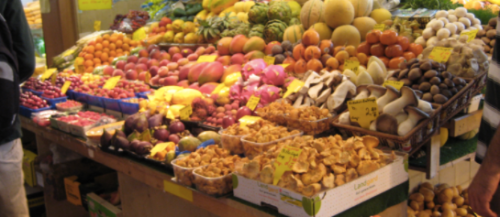Article
Germany: My Year with Food
ID # 3729

Halli hallo! My name is Micaela and I am a sophomore Global Studies and Political Science double major at UNC. Before I started college, I took a gap year to study in Germany with the Congress Bundestag Youth Exchange (CBYX) scholarship program. I lived with a host family in Bruchsal, a small town south of Heidelberg near the French border. The experience was absolutely incredible and taught me not only a lot about cultural immersion and communication, but also about myself.
Before I moved to Germany, I hated cooking. The amount of time it took to make full meals was a real turn-off. I was not excited about the process of cooking, I just wanted to eat. Or at least, that’s how I felt until I met my host family. Unlike me, they took pride in spending time and effort on food and their relationship with cooking made an impression on me.
I found there to be several important differences between food in Germany and food in America. One: speed. I think it’s safe to say that food in America tends to be rushed; take the popularity of fast food chains and frozen dinners as examples. But food in Germany is gemütlich (unhurried), and the commitment to spending time and effort on meals is obvious.
Two: Germans do not eat out much. During my twelve months abroad, my host family and I ate out three times and ordered pizza twice. Otherwise, every meal was homemade, and that required a lot of work. Between preparing the ingredients, cooking them, and cleaning up afterward, lunches and dinners were often hour-long ordeals for my host mom. But I came to realize that even though ordering Chinese or buying a sub may be quicker and easier, cooking meals at home acknowledges that food is an essential part of life, and deserves to be prioritized. Eating out is a quick fix; eating at home is real eating.
Three: Mealtime is family time. In my US family, dinner is spent in front of the TV or alone, a quick stop before moving on to the next activity. Meals in Germany on the other hand are eaten with the family, around a table, because mealtime is not just about food. It is about stopping the rush of the day to be together: to catch-up, to check-in, to just be. And meals are not eaten quickly. Food is savored, enjoyed, and so is the conversation.
So what did all this mean for me? First of all, I decided that I like cooking. Being able to make amazing food is empowering, and I have learned to take pride in the amount of time I spend on a meal. But even more than that, learning about the German attitude towards food taught me a new way to live. I prize the connections I make with people more, and I found a balance between work and relaxation, between cooking and eating, that was missing in my life here in the States. It is a lifestyle I am committed to, because I realized that eating right is not just about food; it is about living right, too.
I’m really looking forward to this semester with Carolina Navigators. It will be a valuable opportunity to share my experiences with students and discuss with them the ways we can all become more globally connected and informed citizens!
Created By
Micaela Arneson
Halli hallo! My name is Micaela and I am a sophomore Global Studies and Political Science double major at UNC. Before I started college, I took a gap year to study in Germany with the Congress Bundestag Youth Exchange (CBYX) scholarship program. I lived with a host family in Bruchsal, a small town south of Heidelberg near the French border. The experience was absolutely incredible and taught me not only a lot about cultural immersion and communication, but also about myself.